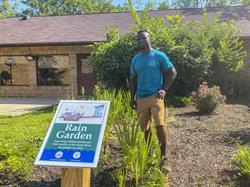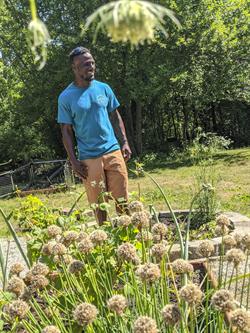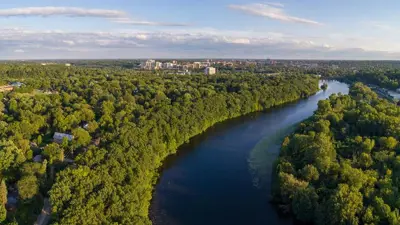Shovel Ready
Former UM gridiron great Vincent Smith digs new career as urban rain gardening master and leader of nonprofit Team Gardens that inspires at-risk youth

ANN ARBOR – Vincent Smith’s trademark as an undersized star University of Michigan running back from 2009-12 was plowing forward into defenses and dragging tacklers with him for extra yards.
Today, Smith is still plowing forward. But he’s focused on advancing a career he never envisioned while pursuing his UM sociology degree.
The Wolverine grad is a proud member of a new class of certified Master Rain Gardeners through a currently free program offered by the Washtenaw County Water Resources Commissioner’s office.
In addition, Smith is one of the founders of the nonprofit Team Gardens, a public health initiative to engage people of all ages in gardening with an emphasis on making gardening and the creation of urban rain gardens more appealing to kids.
“As far as I know, I’m the only African American former college football athlete who’s a master rain gardener in the United States,” laughed the now 30-year-old Florida native during a recent tour of several urban rain gardens he’s created in his adopted hometown of Ann Arbor.
Growing Greatness
Smith’s efforts have gained national media attention for inspiring at-risk youth and promoting healthy eating habits during community- and rain garden-building projects at Team Gardens’ events in Ann Arbor, Detroit and Flint.
"The whole idea of Team Gardens is to bring kids together in their community and get them excited about growing and eating fresh fruits and vegetables, get them physically active in planting their own food and learning from each other about why rain gardens are important," Smith said.
“I really enjoy making it fun for the kids,” he added.
“But I’m also trying to erase the stigma that exists for too many African Americans about gardening. When and where I grew up, gardening for people my age was definitely not cool. It’s still not cool with too many of today’s youth. I want to change that perception. We’re going to make gardening super cool.”
Life after ‘The Hit’
As ESPN reported in a 2017 profile of Smith, he will be forever best remembered outside of Ann Arbor for “The Hit.”
In his final college game, Smith’s iconic maize-and-blue helmet was instantly jettisoned from his head during an unforgettably ferocious tackle by future NFL pro Jadeveon Clowney in the 2013 Outback Bowl. “The Hit” became an instant viral highlight and cemented Smith’s legacy in UM lore.

After his dream of a pro football career fizzled, Smith developed a new game plan to achieve off-the-field success. He began creating “fields of dreams,” so to speak.
“I decided to help make sustainable positive changes in communities,” Smith said. “One thing the University of Michigan emphasizes is group projects. The idea behind Team Gardens is to have group projects that combine the various skills of UM alumni and experts that I ask for help.”
Seeds of Success
In 2013, Smith launched the Team Gardens initiative. He started by planting in his hometown of Pahokee, Florida, where the area’s rich black soil is heralded by local growers as “The Muck.”
“Pahokee was once known as the ‘Winter Vegetable Capital of the World,’ but when I returned after college, all the people in the towns where I grew up had stopped growing gardens,” Smith recalled.
“I immediately realized that the best option for my new calling was to use gardening to provide healthy food for residents.
“Now, Pahokee citizens have access to fresh starfruit, tangerines, guavas, oranges, lemons, mulberries, bananas and more,” he said. “I’m as proud of that as anything I accomplished on a football field.”
After success in Pahokee, Smith expanded north to Michigan and began working in Flint and Ann Arbor, and recently opened a chapter in Detroit.
The Team Gardens website (www.teamgardens.org) cites research findings by the UM School of Public Health’s Department of Health Behavior & Health Education that highlight the benefits of cultivating community gardens and building rain gardens, especially in urban settings.
“Results suggest that the garden programs provided opportunities for constructive activities, contributions to the community, relationship and interpersonal skill development, informal social control, exploring cognitive and behavioral competence, and improved nutrition,” the report noted. “Community gardens promote developmental assets for involved youth while improving their access to and consumption of healthy foods.”
Let It Rain Gardens
Similar to his previous experience with college athletic training, Smith remains intent on a never-ending quest to improve his skills. Only now he’s driven to refine his expertise as a master rain gardener.
“Beyond providing pleasure aesthetically, rain gardens serve an important ecological purpose,” he said.
“Designing a rain garden requires patience and follow-through, two valuable traits that I learned from playing football. Local foods and rain gardens are ways that residents can beautify urban neighborhoods, improve access to fresh produce and engage people.”
When it rains, polluted stormwater from roofs, dirty streets and parking lots often flows directly into rivers through stormwater tunnels. This poses a health hazard for humans, as well as fish and wildlife.
Rain gardens help mitigate those risks. A key reward of this low-tech green infrastructure is that, when properly designed, the system captures the water and filters it into the soil within a day. A rain garden also can channel water away from the foundations of homes and businesses to prevent flooding, reduce loads on stormwater systems, and decrease the amount of lawn chemicals and pet wastes that may otherwise run off into local lakes and rivers.
Best in Field
Smith credits Washtenaw County’s Rain Garden Coordinator Susan Bryan with helping him obtain his Master Rain Gardener certificate. He enrolled this year in the class and “graduated” after building a rain garden at his Ann Arbor home.
The program, which trains people to design and install rain gardens themselves, as well as to serve as their neighborhood expert, is free to Washtenaw County residents during the COVID-19 shutdown.
Bryan has designed rain gardens for over 10 years and mentored over 700 homeowners in planting their own rain gardens. She developed the Master Rain Gardener program for Washtenaw County, and it has spread to six other municipalities. In Ann Arbor, she designed the Miller Avenue rain gardens and the Swift Run streetside rain gardens. She has a Master of Landscape Architecture degree from UM and is herself a Master Gardener.
“Susan is one of the UM’s leaders and best in her field, and I will be forever grateful from what I learned from her teaching,” Smith said.
“The funny thing is, I’m still around the UM football community, but I don’t watch football or go to games anymore. I’m more interested in growing perfect rain gardens and helping growing kids improve themselves.”
Get Stormwater Updates
Sign up for Stormwater and City of Ann Arbor updates.


